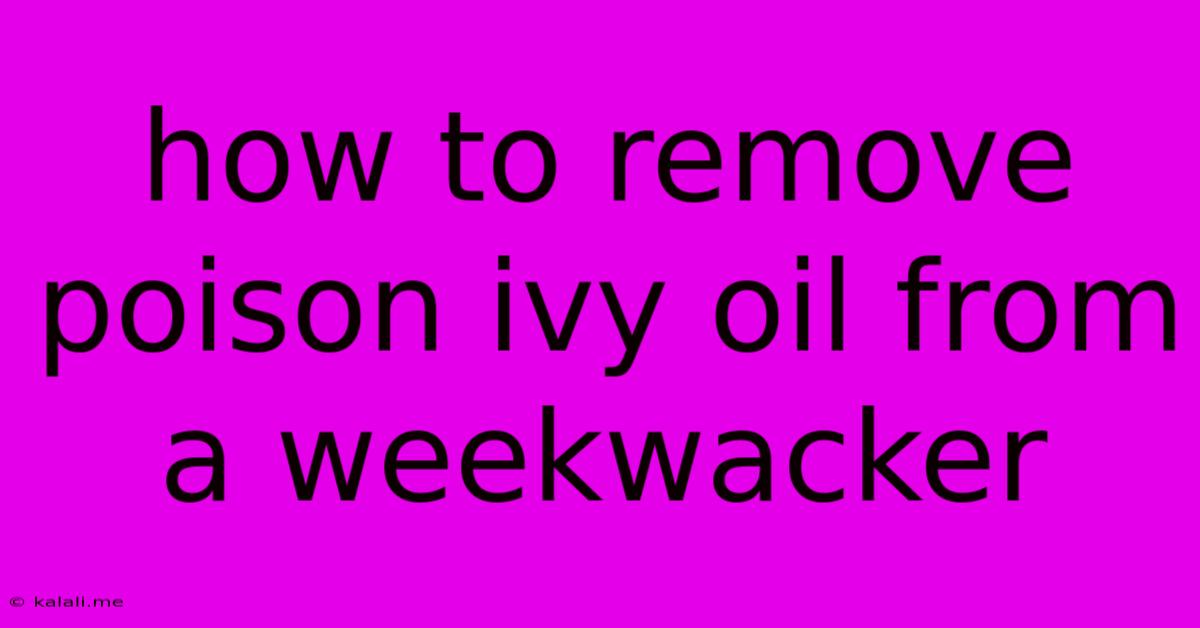How To Remove Poison Ivy Oil From A Weekwacker
Kalali
May 23, 2025 · 3 min read

Table of Contents
How to Remove Poison Ivy Oil from a Weed Wacker: A Comprehensive Guide
Getting poison ivy on your weed wacker is a frustrating experience. The urushiol oil, responsible for the allergic reaction, can linger on the equipment, potentially causing repeated exposure. This guide provides a detailed, step-by-step process on how to effectively remove poison ivy oil from your weed wacker, minimizing the risk of future contact. Remember, safety is paramount; always wear gloves and eye protection during the cleaning process.
Understanding the Threat: Urushiol Oil
Urushiol oil is the culprit behind poison ivy's irritating effects. It's incredibly tenacious and can persist on surfaces for extended periods. Simply wiping the weed wacker down isn't sufficient; you need a thorough cleaning process to remove this persistent oil. We'll outline strategies to effectively neutralize and eliminate the urushiol.
Essential Equipment and Supplies:
- Gloves: Heavy-duty rubber gloves are crucial to protect your hands. Dispose of them properly after use.
- Eye protection: Safety glasses or goggles will shield your eyes from splashes.
- Cleaning solution: We'll explore several effective options below.
- Scrub brush: A stiff-bristled brush is necessary for effective scrubbing.
- Rags or paper towels: For wiping down the weed wacker.
- Water hose: For rinsing the weed wacker.
- Garbage bags: For proper disposal of contaminated materials.
Step-by-Step Cleaning Process:
1. Preparation is Key: Protect Yourself First!
Before you begin, always prioritize safety. Put on your rubber gloves and eye protection. Work in a well-ventilated area, preferably outdoors.
2. Choosing Your Cleaning Solution: Several Options Exist
Several solutions are effective at removing urushiol oil:
- Dish soap and water: This is a readily available and effective option. Mix a generous amount of dish soap with warm water.
- Rubbing alcohol (isopropyl alcohol): This is a strong solvent that can effectively dissolve urushiol oil.
- Laundry detergent: A strong laundry detergent, diluted with water, can also be effective.
- Commercial cleaners: Some commercial cleaners specifically designed for removing oil are available, offering powerful cleaning capabilities.
3. The Cleaning Process: A Thorough Approach
- Initial Rinse: Begin by rinsing the weed wacker with water to remove loose debris.
- Apply Cleaning Solution: Liberally apply your chosen cleaning solution to all surfaces of the weed wacker, focusing on areas where you suspect poison ivy contact.
- Scrub Thoroughly: Use your scrub brush to vigorously scrub all surfaces. Pay close attention to crevices and hard-to-reach areas.
- Rinse Again: Thoroughly rinse the weed wacker with clean water to remove all traces of the cleaning solution.
- Air Dry: Allow the weed wacker to air dry completely before storing.
4. Disposal and Safety: The Final Steps
Dispose of all used cleaning materials, rags, and gloves in sealed garbage bags to prevent accidental contact. Wash your hands thoroughly after cleaning.
Prevention is Better Than Cure: Future Precautions
- Protective Clothing: Always wear long sleeves, long pants, and gloves when using a weed wacker, especially in areas with poison ivy.
- Regular Inspections: Regularly inspect your weed wacker for any signs of plant matter.
- Prompt Cleaning: Clean your weed wacker immediately after each use to prevent urushiol oil buildup.
By following these steps, you can effectively remove poison ivy oil from your weed wacker and minimize the risk of future exposure. Remember, safety and thoroughness are key to success.
Latest Posts
Latest Posts
-
Why Do Dogs Try To Cover Their Food
May 23, 2025
-
At The Drop Of A Dime
May 23, 2025
-
What Does Run Me Like A River Mean
May 23, 2025
-
Encrypt To Random Number Website Generator
May 23, 2025
-
How To Check Continuity With A Multimeter
May 23, 2025
Related Post
Thank you for visiting our website which covers about How To Remove Poison Ivy Oil From A Weekwacker . We hope the information provided has been useful to you. Feel free to contact us if you have any questions or need further assistance. See you next time and don't miss to bookmark.